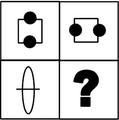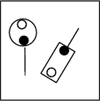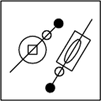WORKING WITH SHAPES - PART 1
Here is some basic information about Part 1 of the actual Working With Shapes Assessment:
- The Working With Shapes Assessment is divided into 2 parts. This is the first of the 2 parts.
- This is a timed assessment. You will have 7 minutes to complete the 14 questions in this assessment.
- Don't be concerned about completing all of the questions. You are not expected to be able to complete all of the questions within the allotted time, so just do as many as you can.
For best results on this assessment please keep the following in mind:
- You do not have to answer the questions in the order that they appear. Skip around and answer the items that are easiest for you; then spend your remaining time checking your answers or working on the questions that you skipped.
- You will find that some types of questions are easier for you to answer than others, so do these first. Avoid spending too much time working on any one question.
And finally, a couple of MUST OBSERVE instructions to avoid having your assessment terminated.
- You must use your mouse to answer the questions in this assessment.
- Do not use your keyboard.
- Do not use the ‘back’ or ‘refresh’ features of your browser.
There 14 questions in Part 1 of this assessment are divided into three types:
- A. PATTERN SEQUENCES
- B. PATTERN GRIDS
- C. FEATURES IN COMMON
Following are example and samples of each of the three types of questions. Review the examples and then work out the answers to each of the sample questions. The correct answers for the sample questions are set out after each sample question.
A. PATTERN SEQUENCES
A sequence of patterns is shown with one pattern missing, indicated by a "?". Determine the logical sequence represented and select the missing pattern from one of five choices, designated as a, b, c, d, and e. Select the letter corresponding to the missing pattern.
Example 1
Solution: The correct answer is a. The sequence grows from the bottom left corner towards the top right adding a dot with each step. The options each have the correct number of dots, but only a is growing correctly.
Do the following sample question. Remember to use your mouse to select your answer.
Sample 1
Solution: The correct answer is d. The pattern is rotated through 90 degrees to the right. As the pattern rotates, the dot in the top left-hand corner is removed. That suggests that the missing number of dots is two, one black and one white, with a horizontal bar. The only pattern that matches this is d.
B. PATTERN GRIDS
Pattern Grids consist of incomplete grids of patterns. You have to decide what the complete set of elements has in common and choose the pattern that has the same elements in common, from five choices: a,b,c,d and e. Use your mouse to select your choice for the pattern that belongs in the space with the "?".
Here is a Pattern Grid example question. Read the solution to help you understand the process.
Example 1
Solution: The correct answer is b. If you rotate the square with two vertical dots by 90 degrees, it becomes a square with two horizontal dots. If you also rotate the oval with a horizontal line by 90 degrees, it becomes an oval with a vertical line.
Now do the following sample question. Use your mouse to select your answer.
Sample 1
Solution: The correct answer is e. The triangle with two lines is rotated 90 degrees clockwise. When the circle is rotated 90 degrees clockwise, the thick black line is on the right.
C. FEATURES IN COMMON
The questions in the Features in Common section consist of pairs of patterns with matching features. After deciding which features the two patterns have in common, choose a pattern with matching features from the choice of five, a,b,c,d and e, and use your mouse to select your answer.
Example 1
Solution: The correct answer is b. Both patterns have the outline of a geometric shape, with one white and one black dot inside. A line joins the shape where the black dot touches the outline. Only pattern b has this pattern.
Sample 1
Solution: The correct answer is c. The two patterns both feature outlines of geometric shapes, one inside the other. A line crosses them, with a white dot and a black dot at one side. Only choice c matches this description.







